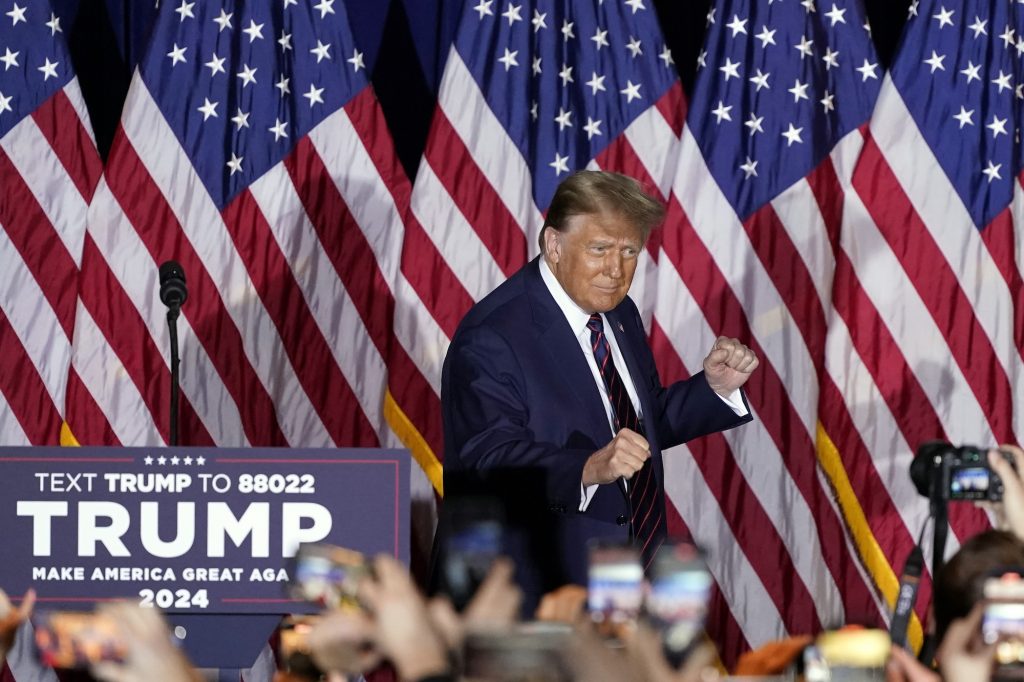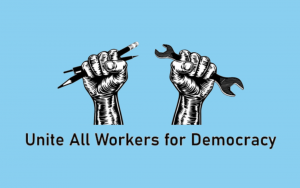Trump’s road to the 2024 Republican nomination took another step forward after winning the New Hampshire primary by a comfortable 11 percent. He defeated his only remaining serious challenger, Nikki Haley, in a state where Haley had hoped to show her strength as the anti-Trump candidate in the Republican field. Haley’s hopes now have to turn to South Carolina, her home state which she served as governor of, where she is currently trailing Trump by roughly 37 percent. In short, it seems that Trump will succeed in his quest to face Joe Biden in a re-match of the 2020 election. And, if polling holds steady and Biden’s crisis doesn’t improve, Trump seems poised to retake the White House in a striking repudiation of four years of Democratic rule.
Over the past week, since his strong victory in the Iowa Caucuses, Trump has been able to consolidate more support behind his candidacy. This took the form both of endorsements from other Republican candidates — most notably Florida Governor Ron DeSantis who pulled out of the race and threw his support behind Trump — and a coalescence of more donor support. Both show, in the words of The Guardian, that it’s time for the Republican to “accept the inevitable”: Donald Trump is going to be the nominee. Notably, many big Republican donors had initially backed Trump opponents — most recently Nikki Haley — but are falling more in line in order to curry favor with the potential next president.
The Crisis that Gave Us Trumpism Rages On
Trump’s strength in the Republican primaries and general election polling is indicative of how he has re-made the Republican Party, and how the deep crisis that gave rise to him in 2016 continues to rage. As we wrote in 2020, the crisis that created Trumpism was here to stay, so even if Trump was defeated in 2020, Trumpism certainly wasn’t. The nature of the crisis is one between, as Italian Marxist Antonio Gramsci once wrote of situations like these, the represented and representatives, where the represented (the masses) no longer see themselves as being adequately represented by those they have elected. This was first opened by the 2008 crisis and further escalated by eight years of the Obama administration which couldn’t resolve the broader crisis of neoliberalism opened by the 2008 crash. This crisis of neoliberalism led to sectors of the masses losing faith in their traditional representatives and these sectors began to look to other solutions, as represented by the twin phenomena of Trumpism and Sanderism in 2016. Trump’s victory in 2016 was a repudiation of the establishment and a turn to the right to look for answers. Biden’s 2020 win was an attempt to re-stabilize the situation after a tumultuous four years of Trump, but that victory alone didn’t resolve the broader crisis.
There was no better indication of that than January 6, which represented a high point of the overall political crisis and required the bipartisan regime to mobilize its forces in order to contain it. In the year or so following the storming of the Capitol, Trumpism and the crisis more generally receded a bit as Biden weaponized the event to restore legitimacy to institutions of the U.S. regime which had been damaged by four years of Trump. But the crisis continued to lurk as the historically low approval ratings of institutions of the regime and increased polarization in the field of politics indicated. Despite his moves to contain the crisis, even in his first two years in office which saw a more latent crisis, Biden was never able to fully resolve it.
As his term wore on, Biden continued to try and position himself as the person to bring stability and legitimacy back to U.S. institutions and he was handed a useful tool to do that on the international stage with the war in Ukraine. However, the U.S. public soured on the war and the far right of the Republican party stepped up to be the voice of opposition, in a vulgar playacting of being anti-war, and framed themselves as the answer to public dissatisfaction with U.S. military engagement abroad.
Of course, Trumpism and the Far Right are not anti-imperialist, nor even anti-U.S. engagement abroad. Rather, they want to turn to the “war at home,” meaning the situation at the border and favor greater measures against immigrants, even deeper militarization of the Southern border, and more aggression toward Latin America. However, because they are the only voices in the political establishment speaking out against the Ukraine war, Trumpism has been able to sell a bill of goods to voters who are tired of constant U.S. involvement abroad.
This distinction over foreign policy has been a key component of the 2024 race to be the Republican nominee with Trump representing this new “anti-interventionist” lie of the Right, and Haley representing a more traditional neoconservative model of being in favor of greater interventions abroad. Haley’s failure to gain significant ground against Trump is an indication of the Republican base’s shift away from the hawkish foreign policy of George W. Bush toward the foreign policy of Trump and his acolytes.
Adding to this increased focus on foreign policy in the election is declining U.S. hegemony abroad. U.S. hegemony has been declining for years, and Israel’s war on Gaza and the U.S. support for it has only increased this decline. The war has also increased the crisis at home with a movement emerging that opposes the bipartisan support for Israel in general and “Genocide Joe” Biden specifically. Restoring U.S. hegemony and, specifically, finding ways to compete with China is at the center of the campaign for president. Both Trump and Biden seem to be in an arms race to see who can be tougher on China, with Trump frequently accusing Biden of selling U.S. workers out to the country — in reality, Biden has certainly sold out U.S. workers but did so in order to better compete with China.
Both candidates favor an increased economic nationalism to compete with China but differ on the specifics of that nationalism. Biden wants to invest money in green technologies and infrastructure as a way of increasing U.S. productive capacity against its rival while Trump favors more protectionist measures and pronounces a more explicitly chauvinistic “America First” nationalism. As the election heats up, expect to hear more and more about China. In many ways, at the current moment, this appears to be an election based around foreign policy with Trump and Biden representing two different approaches to how to oversee U.S. imperialism and competition with China in the coming period.
Another factor in the crisis that is boosting Donald Trump is the economy. While Biden and his supporters want to claim that the economy is doing well — and by many economic measures, it is — the reality for many working people is that they are still struggling to purchase food, gas, and other products amidst rising costs, still unable to purchase homes, still saddled with crippling debt, still working underpaid jobs, still struggling to make ends meet.
While Trump offers a reactionary answer to the economic crisis — one which blames immigrants and the oppressed — a more progressive reaction has been the rising tide of union struggle, demonstrated most clearly in the 2023 UAW strike which fought for radical demands including a four-day work week, massive wage increases, and pointed toward worker control over the transition to electric vehicles. These struggles seek to fight the economic crisis with the power of the working class.
This wave of union struggle too is an indication of the broader crisis of the masses no longer looking to their traditional leaderships and, instead, turning to different solutions. Biden is attempting to co-opt these expressions of progressive dissent by presenting himself as a pro-labor president who, in his framing, has stood with labor — helpfully forgetting, for example, his breaking of the rail strike in 2022. This co-optation of labor is key to Biden’s 2024 strategy — in addition to focusing on abortion rights and “protecting democracy”— where he hopes to win back a sector of the working class which has been “de-aligning” with the Democratic Party over the neoliberal era. Trump isn’t one to be left out, however, and is also trying to co-opt sectors of the labor movement with his explicitly economic nationalist message, as his recent meeting with Teamsters president Sean O’Brian showed. In this sense, the 2024 election will, in many ways, be an explicit battle for the working class’ vote.











